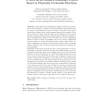9 search results - page 1 / 2 » A Novel RFID Distance Bounding Protocol Based on Physically ... |
IACR
2011
12 years 9 months ago
2011
Abstract. Radio Frequency Identification (RFID) systems are vulnerable to relay attacks (i.e., mafia, terrorist and distance frauds) when they are used for authentication purpose...
SCN
2008
Springer
13 years 9 months ago
2008
Springer
In 2004, Molnar and Wagner introduced a very appealing scheme dedicated to the identification of RFID tags. Their protocol relies on a binary tree of secrets which are shared
PERCOM
2007
ACM
14 years 9 months ago
2007
ACM
Radio Frequency Identification (RFID) is an increasingly popular technology that uses radio signals for object identification. Tracking and authentication in RFID tags have raised...
CTRSA
2006
Springer
14 years 1 months ago
2006
Springer
RFID-tags are becoming very popular tools for identification of products. As they have a small microchip on board, they offer functionality that can be used for security purposes. ...
CCS
2007
ACM
14 years 3 months ago
2007
ACM
Distance bounding protocols have been proposed as means of detecting relay attacks, also known as mafia fraud. In this paper we present the first symmetric key based distance bou...

